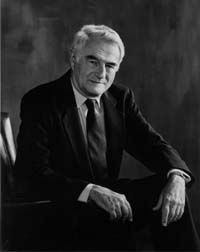Robert L. Sinsheimer: The University of California, Santa Cruz During a Critical Decade,  Robert Sinsheimer1977-1987
Robert Sinsheimer1977-1987
1996, 135 pp. , 1 illus.
Randall Jarrell, documentary historian and head of the Regional History Project, conducted seven hours of taped interviews with Sinsheimer, UCSCs fourth chancellor during 1990-91, as part of the Project's University History series.
Sinsheimer was appointed chancellor by UC President David Saxon in June, 1977. Formerly chairman of the division of biology at the California Institute of Technology where his work as a molecular biologist had earned him a distinguished international reputation. When approached with an invitation to consider heading UCSC he had come to the end of a long period of research and was receptive to a new challenge. His pre-eminent knowledge of the social implications and potential hazards of recombinant DNA technology and cloning methods in biology had deepened his concern about the necessity of promoting scientific literacy among non-scientists. Thus the UCSC chancellorship appealed to him since as a public institution it would give him a forum in which he could address these concerns.
Sinsheimer was UCSC's first chancellor from outside the UC system. His predecessors included founding Chancellor Dean E. McHenry who had presided over the planning and building of the innovative campus from 1961 until his retirement in June, 1974. McHenry was succeeded by Mark Christensen, a professor of geology from UC Berkeley, whose brief tenure was concluded by his resignation in January 1976, after only a year and a half as chancellor. Angus Taylor, a veteran UC administrator, was appointed Chancellor in February 1976, and during his tenure stabilized the fledgling campus while a permanent chancellor was selected.
Sinsheimer arrived to find a campus in need of direction with serious systemic problems. As an outsider he saw UCSC's organization and administration undermining its relationship with the larger UC system, of which it was a small and to some, rather insignificant member.
UCSC's promising academic reputation and innovative early identity had significantly deteriorated by the time Sinsheimer arrived. The outside world (as well as segments of the Santa Cruz community) had come, however wrongly, to view UCSC as a flakey, hippie school, with a questionable academic reputation. Vietnam War demonstrations, drugs, and the campus's counterculture increasingly strained town-gown relations and UCSC's reputation throughout the state. Enrollment figures were down and there were rumors (unfounded) that the campus would be closed for budgetary reasons.
In this volume, Sinsheimer describes why his tenure was a critical decade for the troubled campus. He discusses the many problems he encountered -- the campus's lack of a sense of direction, its ambiguous academic reputation, its complicated administrative structure -- and the changes and reforms he initiated to solve them and bring the campus more into line with the way other UC campuses operated. He also discusses his role as chancellor and the contributions he made to the campus's development, including the Keck Telescope and Human Genome Projects. He also talks frankly about controversies engendered by the Research and Development Park Initiative, college reorganization, the anti-apartheid and divestiture movement, and student activism. His narration includes a prescient analysis of why the UCSC of the 1970s needed to be more closely related to Silicon Valley and the region's proliferating high technology industries. His goal of establishing an engineering school was not realized during his tenure, but the work Sinsheimer accomplished in reorganizing and revitalizing the campus paved the way for one day having such schools at UCSC.

 Santa Cruz, CA
Santa Cruz, CA



